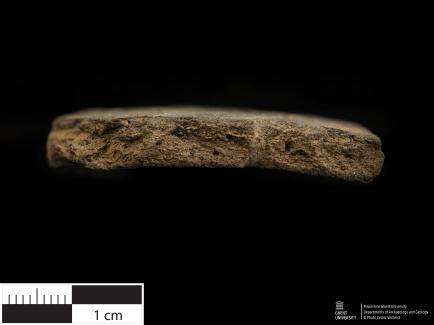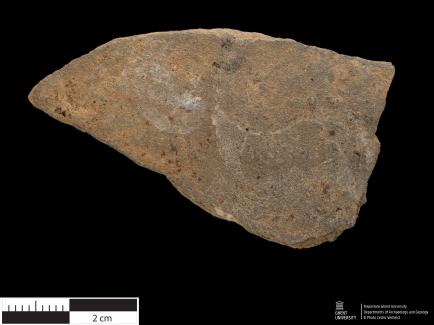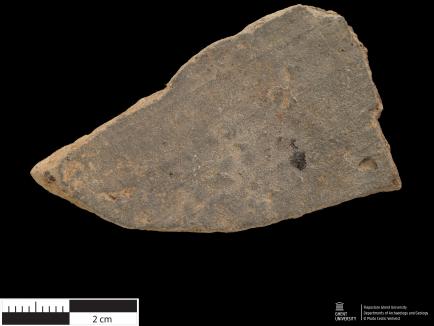Roman - Common reduced ware (5.RE.BE.0002)
Hand specimen pictures (macro & binocular)
Thin section pictures
Find location
- Category
- Common reduced ware (Roman)
- Fabric name
- Gallo-Belgic ware imitation: Terra Nigra-like fabric
- Chronology
- Roman > Middle Roman > Flavian period (69-96 CE)
- Dating method(-s)
- typology
- Potters' mark
- No
- Additional information
- determined types: Holwerda 27 (Deru P48), Hilwerda 30 & Holwerda 26; radio carbon date on a charcoal fragment doesn't match with the typological aspects of the pottery (old wood effect); local imitation of Gallo-Belgic Terra Nigra
Find location
- Site type
- Pottery production
- Location
- Belgium; Oost-Vlaanderen; Zottegem
- Site name
- Sint-Maria-Oudenhove, Faliestraat
- Excavation or Survey Team
- N. Vanholme (Monument Vandekerckhove)
- Additional contextual information
-
project code: SIFAO15; permit code: 2015/196; feature SP161 (pottery dump in the firing chamber); find inventory number: 286
- Surface color
- grey
- Surface texture
- Smooth
- Fracture color
- beige brown
- Inclusions (non-plastics/tempering)
- quartz (very fine grained); iron oxides (?), dark oval inclusions
- Matrix and voids
- /
- Diagnostic features
- Additional information
- sample SIFA_ST2
- Flepostore inventory nr.
- ARCH1.L1.B16
- Original inventory nr.
- A0032
- Collection
- Archaeological Department, Ghent University
- Type
- Covered thin section
- Comparable thin section(s)
- Matrix
-
Brown fabric with dark brown edge; brown to darkbrown (PPL), dark brown (XP).
Semi-heterogenous matrix, non-calcerous with high optical activity.
- ca. 45-60%
- Inclusions
-
Quartz (++; mono, poly, r-sr, silt-fine/medium sand, some weathered or altered, intergrowth), sedimentary rock detritus - possibly slightly metamorphosed - Q-arenite, chert, feldspars (+-; plagioclase, microcline; r, cf), glauconite (+; red in PPL), O/Fe (+), organic matter (charcoal or burned plant), muscovite mica flakes (+-; el, ff & cf), clay pellets or semi-plastics (1. iron-rich and inclusion-poor, 2. iron-poor).
The coarse fraction ranges from medium to very fine sand, the fine fraction from fine sand to silt. Grains are generally sub-rounded to rounded. In general, the fabric is (moderately) well sorted, single spaced and (moderately) poor orientated.
- ca. 30-40%: - Voids
-
Small to large planar voids and vughs, drying cracks around clay pellets, iron oxides and organic matter,
moderately aligned parallel to edge, no infill.
- ca. 10-15% - Diagnostic features
- Semi-heterogenous reduced matrix with high optical activity and moderate porosity. Dominant quartz inclusions with frequent sedimentary rock inclusions, glauconite and opaques/iron oxides, common feldspars, muscovite mica flakes and clay pellets, few large organic inclusions. Overall moderately well sorted.
- Additional information
- High optical activity indicates a relative low firing temperature. Same fabric as sample A0033 (same sherd?).
- Sample type
- Pottery
- Inventory number
- 5.RE.BE.0002
- Collection
- Archaeological Department, Ghent University
- Donating institute/person
- Archeodepot, Archeocentrum Velzeke
- Host collection
- Archeodepot, Archeocentrum Velzeke
- Other samples available
- Yes
- Sample collection method
- Archaeological Excavation
Van Thienen 2020
- Full reference
-
Van Thienen V. 2020: Ceramic petrography analysis of Gallo-Belgic ware imitation from Sint-Maria-Oudenhove, FLEPOSTORE Ceramic Report 01, Gent.
- File
Vanholme 2016
- Full reference
-
Vanholme N. 2016. Archeologische opgraving Sint-Maria-Oudenhove Faliestraat (prov. Oost-Vlaanderen). Baisrapport. Monument Vandekerckhove Rapport 2016/20, Ingelmunster: 120.
- Link
Vanholme et al. 2016
- Full reference
-
Vanholme N., Dalle S., Deschieter J. & Clerbaut T. 2016. Een 1ste-eeuwse site met pottenbakkersoven te Sint-Maria-Oudenhove -Faliestraat (prov. Oost-Vlaanderen). Signa 5: 159-168.
- Link
Cite this page as: Flepostore - https://flepostore.ugent.be/ceramics/5-re-be-0002
Last modified: 2024-04-23.





